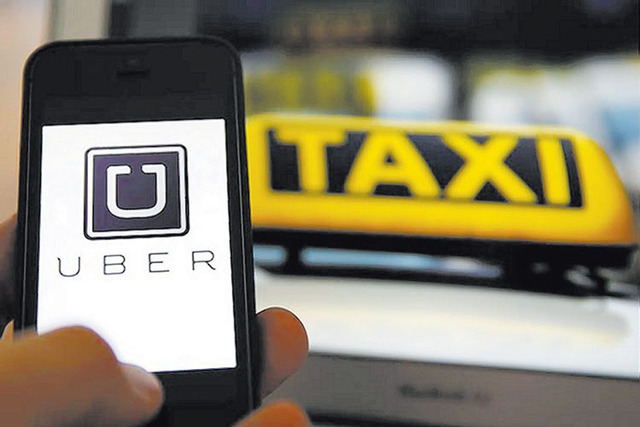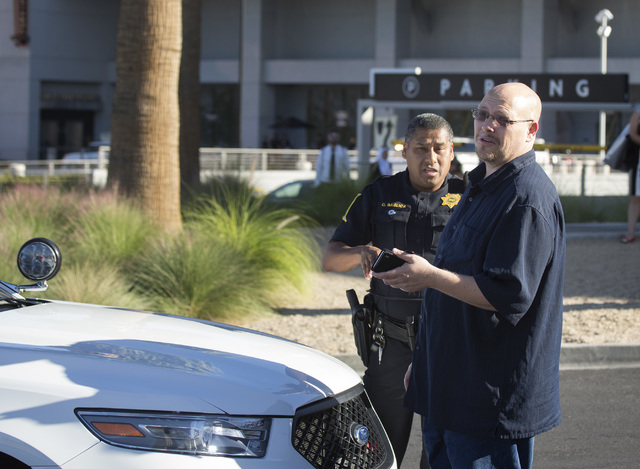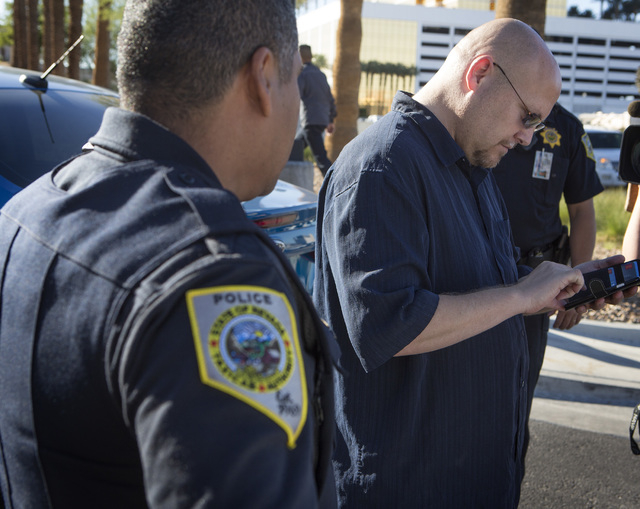Despite Uber petition, service is still illegal in Nevada



To Uber, the ride-sharing transportation network company, and its legion of fans, it’s an easy fix.
Copy and paste legislation that’s been enacted somewhere else, run it before the Nevada Legislature for a vote, get Gov. Brian Sandoval to sign the bill and Uber on.
More than 26,000 people have signed a petition asking Sandoval and Attorney General Adam Laxalt to lead the way toward allowing the company to operate in the state.
There already are 22 jurisdictions that have laws in place that enable Uber and similar companies to do what they do — accept requests from customers through a smartphone app to provide transportation in their personal vehicles.
There’s only one problem: Under Nevada transportation laws, the service is illegal.
More than 1,000 people had signed up as Uber contract drivers last fall, beginning operations Oct. 24.
Just over a month later, the company’s Nevada operation shut itself down after coming out on the losing end of a court case filed by former Attorney General Catherine Cortez Masto that said Uber was endangering the public with its operation.
Since then, Uber Nevada has been in limbo, although the company has promised it would do everything it could to get drivers back on the street.
Uber faces a formidable opponent in the state’s limousine and taxicab industry, which says, essentially, “Go ahead and operate, Uber. Just apply for licensing, pay the permit fees, get the inspections, buy the insurance and follow the same rules we follow.”
Uber doesn’t think it has to do that because it considers itself a technology company, not a transportation provider.
If there were a law spelling out the differences between what Uber does and what the state’s taxi companies do, and what requirements ride-sharing companies would have to meet to operate legally, Uber would be in business.
But until then, the taxi industry vows to fight to make the playing field level, which some interpret as fighting to keep Uber out.
The days are counting down to the Feb. 2 start of the 78th Nevada legislative session. As of mid-January, there were a few bill draft titles filed alluding to changes in state transportation regulations, but no bills outlining if and how companies like Uber should be allowed.
To two key members of the Legislature — the chairmen of the Senate and Assembly Transportation Committees — say it’s still early in the game.
“I’ve talked with both sides, but I haven’t seen one piece of legislation addressing this,” said Sen. Scott Hammond, R-Las Vegas. “It’s going to be a challenge to address the way technology companies come into the state with the way they view themselves because this isn’t the traditional type of transportation.
“This isn’t just about taxicabs, either. These tech companies span a number of industries, and I relish the opportunity to hear from both sides of the issue to see if there’s a way to make it work, and I look forward to the challenge,” he said.
With Republicans taking control of the Senate this year, it will be Hammond’s first crack at chairing the Transportation Committee. He expects it to take some time to get a proposal for consideration.
“I think, conservatively, we’re not going to see anything until the third or fourth month (of the 120-day session),” Hammond said. “They’re going to have to explain to us why we should treat them differently from the taxi companies.
“We’ll start as soon as we have some legislation in front of us, but this is one of those issues that I think we’ll need a bill that we’re going to have to massage quite often.”
In the other chamber, the chairman of the Assembly Transportation Committee expects a contentious debate and sees himself as just the guy to hear it.
“Coming from a place that only has a couple of taxicabs, I don’t have a dog in the fight,” said Assemblyman Jim Wheeler, R-Minden.
Wheeler said Uber hasn’t reached out to him yet, but the taxicab companies “have been beating down my door.” Like Hammond, Wheeler doesn’t expect to address the issue until midsession, at the earliest.
As a free-market Republican, Wheeler doesn’t believe the goal should be to cut corners for Uber — the state should ease regulations for all.
“If you make a better model, you should be encouraged to be in the market,” he said. “But the playing field needs to be level.”
Wheeler said taxi companies are loaded down with costly regulations.
“We need to find some middle ground to reduce regulations that don’t affect public safety,” Wheeler said.
“I’m not thrilled with (Uber’s) insurance model or (its) background-check model, but we need to look at the whole thing, especially on something as contentious as this.”
Contentious indeed.
That’s the way things were in Washington in October when the D.C. Council debated ride-sharing legislation. Uber supporters were on the winning end of a 12-1 vote when the proposal was made days after Uber began providing rides in Las Vegas, Reno and Carson City. Union taxi drivers walked out of the council chamber in disgust.
In the end, the D.C. Council approved a plan that spelled out how much insurance coverage was required by Uber when drivers were awaiting a hail and when they had a paying customer in the car.
The D.C. Council also allowed Uber to conduct private background checks on drivers after a proposal to require FBI checks failed.
The regulatory body in Washington, the D.C. Taxicab Commission, argued that it needed an inventory of vehicles and drivers to monitor the industry, information Uber considers proprietary. The council didn’t make that an operational requirement.
The legislation included a “trade dress” requirement to identify ride-sharing vehicles. Vehicles used by contracted motorists must have some form of designation as a transportation provider. Pink mustaches on the grills of Uber rival Lyft driver’s cars were found acceptable.
The Washington legislation also requires Uber to pay a regulatory fee of 1 percent of its gross revenue.
What would Nevada ride-sharing legislation look like? It’s hard to say, based on the various stances taken by Uber, Nevada’s regulatory agencies, the taxi companies and the experts expected to testify before lawmakers.
Justin Kintz, director of North American public policy for Uber, said the Washington and Illinois regulatory models work favorably for his company.
“It’s still early in the game and we’ve been in discussions with various legislators ever since we ceased operations in November,” Kintz said.
“We feel the Washington, D.C., and Illinois models are very progressive and comprehensive.”
Uber has been working to sell state lawmakers on the economic development benefits of providing a means for the company to operate. They say enabling Uber to operate puts more than 1,000 people to work. Critics dismiss that, saying contract drivers generate income but get no benefits — health insurance, vacation time or retirement programs.
Kintz said Illinois’ legislation included an interesting benefit to cab companies.
Uber’s business model includes dynamic pricing, branded by critics as “surge pricing,” an increase in rates when demand is high. Dynamic pricing isn’t allowed in Nevada, which requires rates based on metered distance and time.
It wasn’t allowed in Illinois, either, but under the new legislation rides hailed with a phone app can use dynamic pricing when companies are busiest.
Las Vegas taxi companies are seeking regulatory approval for smartphone e-hailing apps, which will be considered by the Nevada Taxicab Authority when it meets Thursday.
Follow @RickVelotta on Twitter. Contact reporter Richard N. Velotta at rvelotta@reviewjournal.com or 702-477-3893.

RELATED STORIES
Nevada has waited a long time for the year of real reform
PERS points out weaknesses in Nevada think tank’s retirement study
New Reno veterans home among Sandoval’s goals
Study: Many public-sector retirees making more than they did on job
Sandoval budget would boost autism funding in Nevada
Sandoval proposes big boost in Nevada education funding
Sandoval proposes $7.3 billion spending plan for Nevada
New year could bring big changes in state
See all of our coverage: 2015 Nevada Legislature.












